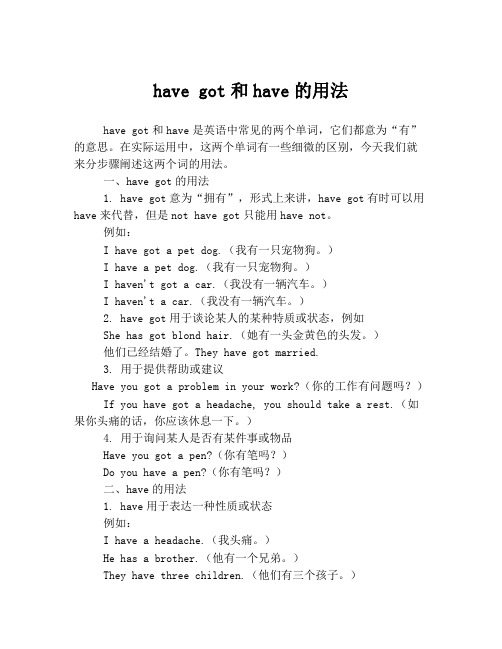have 与 have got区别 (课堂PPT)
Havehas got的用法 语法 (课堂PPT)

6
在下列情况下不能用have got来代替have。
• A. 在情态动词,助动词或动词不定式之 后,只能用have,不用have got。如:
否定句:在Have或Has后加not, 缩写 为Haven’t或Hasn’t.如:
I have got three sisters. → I haven't got three sisters.
He has got a bike. → He hasn't got a bike.
3
B、一般疑问句:把Have或 Has提前到句首
11
三、There be 句型中be动词 的确定
• there be 结构中的谓语动词be在人称 和数上应与其后的主语保持一致。主语 是不可数名词或单数可数名词时用is,是 复数时用are。
There is a flower in the bottle. 瓶里有一朵花。 There is some money in the purse. 钱包里有些钱。 There are four apples on the desk.桌子上有四个苹果
• I have had the bike for three years.我买这辆自行车已经3年了。
8
固定短语中不用have got
• have a rest • have a a swim • have a a wash • have a a drink • have lunch • have a meeting, • have a party . •
小学英语 Have, Have got

Peter ______________ a beautiful new house in the countryside. has OR has got __________________________ (she) any children? Does she have OR Has she got I __________ a fantastic apartment in New York when I lived there. had Tom __________ a shower at the moment. Can you call back later? is having I'm afraid we _____________________ enough space in the garage. haven’t got OR don’t have
Negative He, She, It HAVE GOT Subject + does + not + have + objects She does not have a dog. Contraction: She doesn't have a dog.
Check your understanding with this:
Positive He, She, It HAVE Subject + have + objects She has a new car. There is no contracted form
Question I, You, We, They HAVE GOT (?) + have + subject + got? How many children have you got? There is no contracted form
have got和have的用法

have got和have的用法have got和have是英语中常见的两个单词,它们都意为“有”的意思。
在实际运用中,这两个单词有一些细微的区别,今天我们就来分步骤阐述这两个词的用法。
一、have got的用法1. have got意为“拥有”,形式上来讲,have got有时可以用have来代替,但是not have got只能用have not。
例如:I have got a pet dog.(我有一只宠物狗。
)I have a pet dog.(我有一只宠物狗。
)I haven't got a car.(我没有一辆汽车。
)I haven't a car.(我没有一辆汽车。
)2. have got用于谈论某人的某种特质或状态,例如She has got blond hair.(她有一头金黄色的头发。
)他们已经结婚了。
They have got married.3. 用于提供帮助或建议Have you got a problem in your work?(你的工作有问题吗?)If you have got a headache, you should take a rest.(如果你头痛的话,你应该休息一下。
)4. 用于询问某人是否有某件事或物品Have you got a pen?(你有笔吗?)Do you have a pen?(你有笔吗?)二、have的用法1. have用于表达一种性质或状态例如:I have a headache.(我头痛。
)He has a brother.(他有一个兄弟。
)They have three children.(他们有三个孩子。
)2. have和has用于构成现在完成时态,表示“已经完成”,例如:I have finished my homework.(我已经完成了我的家庭作业。
)She has read this book before.(她以前读过这本书。
have与have got的用法

have与have got的用法Have与Have Got的用法Have和Have got都是表示“有”的意思,但在使用上有一些区别。
1. HaveHave是一个常规的动词,表示拥有或持有某物。
它可以用于各种时态和语态,如:- 现在时:I have a car.(我有一辆车。
)- 过去时:She had a headache yesterday.(她昨天头疼。
)- 将来时:We will have a party next week.(我们下周要开派对。
)- 现在完成时:He has finished his homework.(他已经完成了作业。
) - 被动语态:The book has been read by many people.(这本书被很多人读过。
)2. Have gotHave got是have的口语形式,通常只用于现在时态。
它的意思与have相同,但有时会强调拥有某物的事实。
例如:- I have got a new phone.(我有一部新手机。
)- She has got a lot of friends.(她有很多朋友。
)- Have you got any money?(你有钱吗?)注意:在英式英语中,have got也可以用于过去时和将来时,但在美式英语中不常用。
3. 区别虽然have和have got的意思相同,但在使用上有一些区别:- Have got通常只用于口语,而have可以用于口语和书面语。
- Have got强调拥有某物的事实,而have则没有这种强调。
- Have got不能用于进行时态,而have可以。
例如:I am having a good time.(我正在度过愉快的时光。
)4. 常见用法除了表示“有”之外,have和have got还有一些常见的用法:- Have a good time.(玩得愉快。
)- Have a look.(看一看。
)- Have a seat.(请坐。
《I_ve got a new book》PPT课件

PRACTISE A:Have you got ... B:Yes, I have./No,I haven't.
Homework:
运用I've got...回家自己做个家庭调查, 并写出至少五个 book.
Have you got a book? Yes, I have. No, I haven’t.
Has Sam got a book?
Yes, he has. No,he hasn’t.
Sam has got a pen. Sam拥有一支笔。
学习P50Part2课文内容, play the flash then answer to the follow questions.
我有一个篮球。
basketball
I've got a table tennise. 我有一个乒乓球。
table tennise
I’ve got=I have got about 关于
I’ve got a book. 我拥有一本书。 It’s about animals.它是关于动物的。
I’ve got a … dress/coat/sweater/blue T-shirt…
Module 9
Unit 1 I’ve got a new book.
-.
have got 拥有(用于第一、二人称和第 三人称复数) has got 拥有(用于第三人称单数) I’ve got=I have got about 关于
I've got a foorball.
我有一个足球。
I've got a basketball.
Has Lingling got a book? Has Amy got a blue sweater?
have,have got,have got to的区别

have与have got的用法have, have got表示占有,相互关系和其他状态。
实际上这涉及到have动词的三种用法,作助动词,作实义动词单用,以及have got。
虽然他们意思相同,但是用法存在一定差别(特别是地域性差别)。
一般来说,我们避免直接使用have形式(原文:“这看起来不自然”)在十分正式的英国英语里面,还可以使用Have you sth.?以及I haven't sth.,这在美国英语是绝对不出现的。
在非正式文体中,have got 更好。
但是have got形式不经常用在其他时态,比如I had got,I will have got都比较少见。
但是可以与情态动词合用:She must have got a nice present.当我们表达重复性动作的时候,使用do + have的形式,而不是have got以上的用法以英国英语为标准。
如果在美国英语里面,do+have几乎是最常用的形式,口语中则会出现have got。
不过随着时间的推移,美国英语对英国英语影响越来越大,现在do + have的形式也经常被使用。
have和have got的区别,尤其是在疑问句和否定句方面。
2、在英语口语中,常用have got代替have,作“有”解。
I have a bike.=I have got a bike.(1)其否定式为:Idon’thave a bike.=Ihaven’ta bike.Ihaven’tgot a bike.(√)Idon’thave got a bike.(×)(2)其疑问形式为:Have you a bike?/Have you got a bike?Do you have a bike?(√)Do you have got a bike?(×)3、在下列情况下不能用have got来代替have。
(1)在情态动词,助动词或动词不定式之后,只能用have,不用have got。
have got has got和There be句型(课堂PPT)

新标准英语Book Seven
have / has got和 There be句型
朝阳小学 禚文娟
1
• There is a picture on the wall.
• There is aபைடு நூலகம்boy under the tree.
• There are many books on the desk.
ATrheertheearreelloottssooffssttaammppss?. Yes , there are . / No , there aren’t .
A变Thr一eert般ehe疑arree问as句noym时be,obosokoosmkaesb要aob变uot为uCthaCninhyain.?7a .
I have got many good friends.= I've got many good friends.
We have got some Chinese books .= We’ve got some Chinese books .
13
has got 可以和主语缩写为’s got . 如 He has got… =He's got… He has got a book.=He’s got a book.
1. I __h_a_v__e_g_o__t _ a bike. 2. He __h__a_s_g__o_t__ a Chinese kite . 3. You __h__a_v_e_n_’_t_g_o_t__ any bikes. 4. Your sister ___h_a_s__g_o_t__ a new bag . 5. We _h__a_v_e__g_o_t_ some books. 6. Our teacher_h__a_s_n_’_t _g_o_t_ any books. 7. Tony _h_a_s__g_o_t_ many friends.
have,have got,have got to的区别

have与have got的用法have, have got表示占有,相互关系和其他状态。
实际上这涉及到have动词的三种用法,作助动词,作实义动词单用,以及have got。
虽然他们意思相同,但是用法存在一定差别(特别是地域性差别)。
一般来说,我们避免直接使用have形式 (原文:“这看起来不自然”) 在十分正式的英国英语里面,还可以使用 Have you sth.?以及 I haven't sth. ,这在美国英语是绝对不出现的。
在非正式文体中, have got更好。
但是have got形式不经常用在其他时态,比如 I had got , I will have got都比较少见。
但是可以与情态动词合用: She must have got a nice present.当我们表达重复性动作的时候,使用do + have的形式,而不是have got 以上的用法以英国英语为标准。
如果在美国英语里面, do + have几乎是最常用的形式,口语中则会出现 have got。
不过随着时间的推移,美国英语对英国英语影响越来越大,现在do + have的形式也经常被使用。
have和 have got的区别,尤其是在疑问句和否定句方面。
2、在英语口语中,常用have got 代替have ,作“有”解。
I have a bike. = I have got a bike.(1) 其否定式为:I don’t have a bike. = I haven’t a bike.I haven’t got a bike. (√)I don’t have got a bike. (×)(2) 其疑问形式为:Have you a bike? / Have you got a bike?Do you have a bike? (√)Do you have got a bike? (×)3、在下列情况下不能用have got来代替have。
- 1、下载文档前请自行甄别文档内容的完整性,平台不提供额外的编辑、内容补充、找答案等附加服务。
- 2、"仅部分预览"的文档,不可在线预览部分如存在完整性等问题,可反馈申请退款(可完整预览的文档不适用该条件!)。
- 3、如文档侵犯您的权益,请联系客服反馈,我们会尽快为您处理(人工客服工作时间:9:00-18:30)。
2020/4/5
9
• 注意:
• 1. 如果be going to后接的是形容词或副词 (there)时,其后应加上be,然后再接形容 词或副词。
I’m going to be busy this Sunday.
这个星期天我很忙
2020/4/5
10
• 2. there be句型也可用于这种句型中,但 there不能和have连用。
Have 和Have got的区别
1
二者都是“有”“拥有”的含义
• We have got a new car. We have a new car.
She has got a stomachache. She has a stomachache.
2020/4/5
2
二者的否定和疑问不同
• Have 的否定 don’t / doesn’t have I don’t have a car.
There is going to be an English film this evening. 今天晚上有一场英文电影。2020/4/5 Nhomakorabea11
• 二、Will +动词原形 Will 可用于任何人称(口语中)
1.表示主动愿意或要求去做某事 The bag looks heavy. I’ ll help you with it.
Shoes
2020/4/5
are made by them in that factory. were
19
被动语态的大体构成: Be + PP(过去分词)
主动语态变被动之歌:
2020/4/5
6
Future
将来时态
7
一般将来时表示在将来某个时间要 发生的动作或存在的状态
• 一、be going to+动词原形 • 1.表示打算在最近或将来要做某事。这种
打算往往是事先考虑好的。如:
My brother is going to learn English next year. 我哥哥准备明年学英语。
2020/4/5
12
• 2.表示预料中将要发生的动作或情况。 You’ll feel better after having this medicine. 吃了这药,你就会感到好些的。
• 3.will表示人的主观意愿,它带有浓厚的 感情色彩。
Come earlier tomorrow, or I won’t let you in. 明天早点儿来,否则我不让你进来。
固定短语中不能用Have/has got
Have breakfast/ lunch/dinner/supper Have a cup of tea/ coffee/ cigarette Have a bath/ a shower/ a swim/ a rest Have a party/ a holiday/ a nice time Have an accident/ an experience Have a look/ a chat/ a baby Have difficulty/ trouble/ fun
I am going to meet Tom at the station at six. 我六点钟要到火车站去接汤姆。
2020/4/5
8
• 2.表示说话人根据已有的迹象认为非常可 能即将发生某事。如:
Look at these black clouds——it is going to rain. 看这些乌云——要下雨了。 I’m afraid I’m going to have a bad cold. 恐怕我要得重感冒了。
Have 的疑问 Do /Does + 主语+have+其他+?
Do you have a car?
2020/4/5
3
• Have/ has got 的否定 主语+haven’t(hasn’t) got +其他 I haven’t got any money.
Have/ has got 的疑问 Have/ Has+主语+got +其他? Have you got any money?
2020/4/5
18
主变被解题步骤:
1. 找宾语 ----即动作的承受者
2. 判断宾语的单复数 ----即be动词的单复数. 3. 判断动词的时态 ----即be动词的时态. 4. 将原句动词改为过去分词 5. 修改原句的主语 ----即by+ 主语/ 宾语.
They make shoes in that factory.
2020/4/5
13
• 4.在问对方是否愿意或表示客气的邀请或 命令时,常用will。
Will you go to see a film with us? 你愿意和我们一起去看电影吗? 5.表示不以人们的意志为转移的规律。
He is fourteen this year, and he will be fifteen next year. 他今年十四岁,明年十五岁。
2. be going to 含有“计划,准备”的意思,而 will 则没有这个意思 P 46 A
2020/4/5
16
Passive
被动语态
17
一:英语的谓语动词有两种语态
We speak
主语
谓语
English.
宾语
主动语态
English is spoken by us.
主语
谓语
宾语
宾变主,主变宾,前加by
2020/4/5
14
• 二、Shall+动词原形 Shall 用于第一人称 表示建议或征求对方的意见。
Shall we go at eight? 我们八点去好吗? I shall go now.
2020/4/5
15
Will 和be going to 区别
1. be going to 表示根据某种迹象,将来肯定 发生的事情,而 will 则没有这个意思 He is seriously ill. He is going to die.
2020/4/5
4
• 注意 Have / has got 没有时态的变化,只能用于 一般现在时,不能用于完成时,过去式和 将来时等时态
• Li Hong had a problem yesterday. • I have had the bike for three years.
2020/4/5
5
